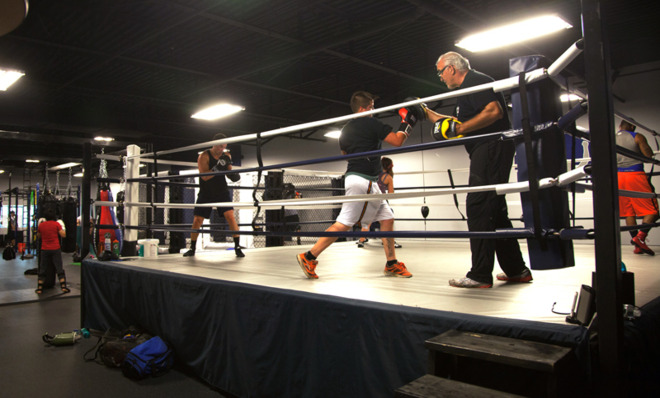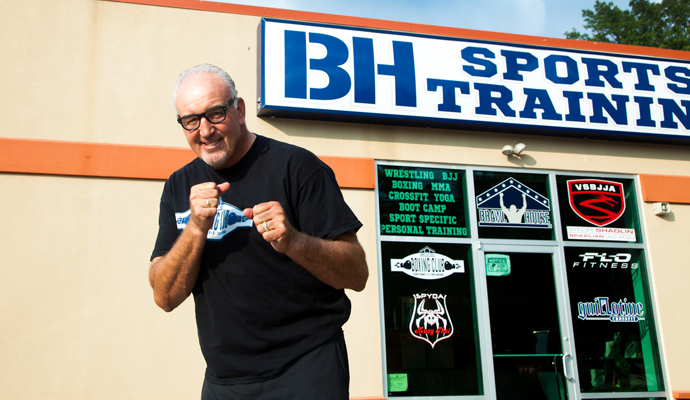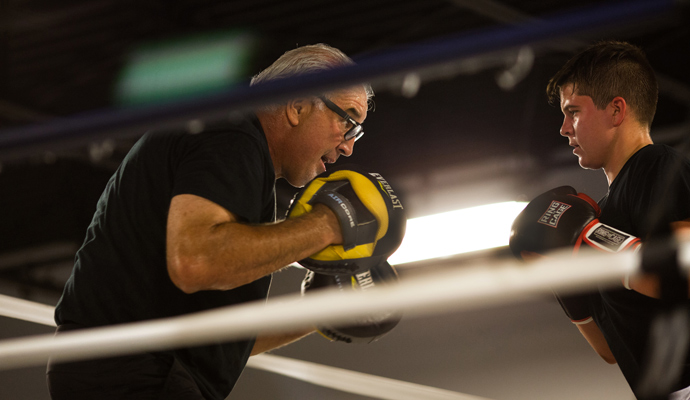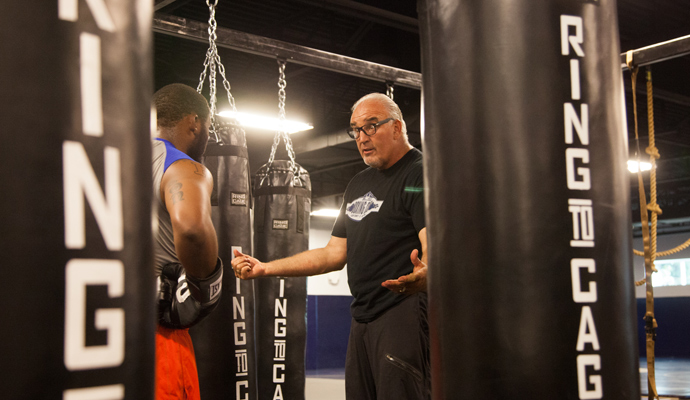The rise, fall, and redemption of Gerry Cooney
In the clearing stands a boxer...

A free daily email with the biggest news stories of the day – and the best features from TheWeek.com
You are now subscribed
Your newsletter sign-up was successful

"For a man rings like a cracked bell when he thinks and acts with a split mind — one part standing aside to interfere with the other, to control, to condemn, or to admire." -Alan Watts, The Way of Zen
Back when he was the leading contender for the world heavyweight championship of the world, back in the early 1980s, Gerry Cooney didn't seem hard to fathom.
Gerry was the working-class kid from suburbia who took an afternoon Long Island Railroad train to work every day in Manhattan. On the way, he sprawled over three seats and laughed and flipped through magazines. Arriving at Penn Station, he shadowboxed with strangers who called his name and bantered with the guys working at the newsstands. He was a one-man parade for the two-block walk to Gleason's Gym, waving and mugging to passersby.
The Week
Escape your echo chamber. Get the facts behind the news, plus analysis from multiple perspectives.

Sign up for The Week's Free Newsletters
From our morning news briefing to a weekly Good News Newsletter, get the best of The Week delivered directly to your inbox.
From our morning news briefing to a weekly Good News Newsletter, get the best of The Week delivered directly to your inbox.
He was the goofy prankster, a hulk with a leprechaun face and a Corleone whisper. He had a pile of curly black hair, pudgy cheeks, thick ribbons for lips, and a lantern jaw. At 25, he seemed to have won the Irish lottery — all the charm and none of the black moods.
Callers to his home got this message on his answering machine: "I'm in the shower so I can't come to the phone because I hate to talk when I'm all wet. So at the tone, please leave your name and number. Have a nice day."
He joked with reporters, then laughed with friends about how clueless reporters could be. "Hey, did I tell you about the interview I gave to a newspaper guy in Ohio?" he told one friend. "Yeah, he asked me how I trained. I told him I was on an all-alcohol diet and that I painted my room black the day before the fight. I think he almost believed me."
Beyond the merriment — what made the whole Gerry Cooney narrative believable and poignant — was the story Cooney told about his stern father who drove him to become a champion.
A free daily email with the biggest news stories of the day – and the best features from TheWeek.com
(More from The Big Roundtable: The hotel of enlightenment)
The story went like this: Tony Cooney, an ironworker, drove his boys to succeed in the ring because he didn't have much chance for a good life himself. The old man taught his boys to work hard: mowing and weeding the garden, working in the basement wood shop, and boxing at the Y. When Gerry's pals Hilton Cohn and George Munch drove by in their big 1970s American cars, honking their horns and teasing him about his endless chores, Gerry looked up sheepishly.
Tony, the story went, didn't know how to tell Gerry he loved him — a typical father-son divide. But deep down, the story went, Gerry knew his dad cared.

"It was hard, the way he showed his love," Cooney said then, in that halting shy bruiser voice of his, after his father died. "I didn't understand what he was trying to teach me. Now I know, but it came too late for him to see it. After he was gone, I realized he was trying to strengthen my mind to make me better."
Later, Cooney elaborated on this father-son myth of love.
"I've seen a lot of father-and-son relationships that are bad," he said. "I plan on doing things differently. If my son wants a boxing career, I won't stop him, but I definitely won't push him. It's bad for a kid to be pressured."
From the time he first attracted public notice — when he won two Golden Gloves, got invited to the Olympic trials, and boxed in Europe — Gerry Cooney won fans with his gentle, easygoing nature. Cooney talked softly, in a whisper. Even though he had experienced hurt, he didn't blame anyone for anything. He just pursued his goal of "seeing how far I can go with this." He listened to soft rock and played the role of the lovable Irish mope.
In 1981, a Sports Illustrated cover story described Cooney as a man-child reveling in the joys of success. William Nack, one of the best sportswriters of his day, followed Cooney around Huntington and recorded his antics. Cooney caused a stir when he squirted people with a water pistol at the Walt Whitman Mall. Then he was off to Walt Whitman High School, his alma mater, where he bantered with an old high school teacher. Then he was off to explore the town in his brand-new Cadillac. He bathed in the cheers of old friends and strangers.
"Gerry Cooney lives in a world unfettered by complexities," Nack concluded. "He is 24 years old, but so far he has been able to escape the inhibitions that come with adulthood and has remained essentially the boy he always wanted to be."
As he prepared for his chance to win the world heavyweight championship of the world — he would fight Larry Holmes in June of 1982 — Cooney played along with the heartwarming narrative for sportswriters and publicists, friends and neighbors to soften the rough edges of his story.
It was always about the pop.
"Two weeks after he was buried it hit me — things I wanted to say to him and never said to him, things I wanted to do with him again," Cooney told one reporter. "I realized why he made me do all those things. He wanted me to be better than him. He wanted me to have what he never had. That's all. It was hard to see them, but I see it now. I wish he were here so I could tell him that I understand."
Sons with troubled relationships with fathers struggle to develop their own identity. They desperately want attention and approval, but they also want separation and independence. When they get too far away, they veer back toward their dads, no matter how much pain they get for the effort.
So Cooney played the loyal and lovable son, brother, and friend. He bought people cars, paid restaurant and bar tabs, arranged jobs, gave away ringside seats. He became the man of the house when he was 16 because his father, bless his soul, died of cancer. Gerry was so devastated by his pop's death that he even passed up a chance at the Olympics. His heart just wasn't into it.
Now it was, and now he was going to honor Tony's memory by winning a heavyweight championship.

(More from The Big Roundtable: After the tsunami)
Gerry Cooney tried to believe his own rationalizations about his stern but loving father. But somewhere, buried deep in the restricted, no-fly zones of his psyche, he knew he was driven by anger and fear, which spilled out of his desire to please the man who could not be pleased.
"I have this want-to-be-liked thing, but deep down I had this rage," Cooney says now. "I was just — I was blinded. I wasn't healthy enough to be able to learn more. I had one mode — to fight."
The rage went back to life at the red Cape Cod on Holland Street in Huntington Station where Tony and Eileen Cooney raised four boys, Thomas, Michael, Gerry, and Stephen, and two girls, Eileen and Madeleine. They looked like a good, strong, working-class family. They went to Mass and did chores. They ran and lifted weights. The boys boxed in a ring in the back yard, at the Y, in the streets, and in the school gym.
But Tony Cooney didn't just push his kids. He bullied them.
"He would beat me with his hands, his belt," Cooney years later, after his own battles with alcoholism and drugs, twisted relationships and squandered possibilities, ego trips and depression. "How do you do that to your kids? He drank and was very physical. He kept us under control. He kept us separated. We all had different hiding places. Mine was in the basement."
Tony didn't need to drink to get abusive. Cooney remembers the time, on a Saturday evening after Catholic Mass, when Tony asked his four sons if any of them had taken his tool belt. They all said no. Tony ordered them into the garage. He closed the door and beat each one of them, one by one.
Words hurt even more than fists or belts. Cooney remembers the year his father told him to make a list of gifts he would like for Christmas. Gerry brought him the list. Tony hit him in the face. "You don't deserve anything," he said.
Always came this refrain from his father: "You're no good. You're a failure. Don't trust nobody."
The child of an alcoholic or abuser develops three survival techniques. First, avoidance: becoming invisible so the sick father or mother can't hurt you or shame you. Second, fighting back: gaining power, tragically enough, by doing the same kind of damage … usually to someone else. Third, pleasing the abuser: if the alcoholic only knew how much you love him, how good you are, maybe the violence would cease.
None of these strategies works. Each, in fact, reinforces the patterns of abuse.
(More from The Big Roundtable: The man who hid an an airplane bathroom)
Like many children of alcoholics, Gerry Cooney followed all three approaches. When his father returned home to Long Island from his job in the city, Gerry fled to his safe haven in the basement. All these years later, Cooney struggles to talk about those moments of fear. Whatever pain he experienced, he still doesn't remember fear. "I was never cowering," he said, correcting a visitor on his word choice. "It was out of sight, out of mind. I never wanted attention on me."
Cooney learned how to fight back. That's what boxing was all about. He started boxing when he was twelve years old at the Huntington Athletic Club. He continued at the YMCA. He battled his frustration by hitting the bags. He discovered he was good. He won some bouts, but was still awkward.
Cooney learned his most important lesson as a fighter when he was fifteen years old. A local thug harassed his brother, Tom, at a bar. The two went outside.
Tom, Gerry says, had more potential as a boxer than his little brother. He could have been a contender. But Tom would not make the commitment that his father — and the sport — demanded. Anyway, Tom knew how to throw a punch.

"My brother gave him a left hook to the body and the right hand to the chin," Cooney recalls. "He knocked the wind out of him. It was the most horrific scene, seeing this guy on the floor, with no wind in the stomach. I was scared for the guy. I was scared for my brother. I thought he was dead."
Gerry learned his biggest lesson about boxing — and life — that day. Forget about fear, forget about feelings. Win by destroying the other side. Overcome your own demons by humiliating the other side.
From then on, Cooney's strategy in the ring was to paralyze his opponents with a left hook to the midsection, to set up a flurry of hits to the head.
"I liked to watch the expression in the fighter's face change when you connected with him," he says. "You know when you connect in the right spot. It's like a tunnel vision."
"Boxing was a way to express my anger. All of a sudden I was expressing anger and I was good at it," he says. "I was like a Jekyll and Hyde. Boxing helped me. because I was fighting the anger out. I was knocking guys out.
So: When you get into the ring, you read your opponents' eyes. Pay attention to how they breathe. Gauge their leg strength. Do they weave? Back up? Dip their shoulders? Lift their gloves? Look angry? Hurt? Scared? Then look for an opening and hit it hard, don't let up, make more openings and then hit them hard.
But Gerry also followed the third strategy of surviving life with an alcoholic. Even after the abuse — especially after the abuse, even — he worked to please his father. He did yard work, before and after school. He took boxing pointers from the old man. He listened to his father's philosophy of fighting and life. At one point, he even worked alongside his father as an ironworker in Manhattan.
As anyone who's even been to 12-Step meeting knows, alcoholism has a cunning way of reproducing itself. To get pop's approval, embrace his anger and resentment. Like father, like son.
Fame — and with it, a chance to build a life of his own — arrived when Cooney won the Golden Gloves in front of 21,000 boxing fanatics at Madison Square Garden in 1972. He was just 16, a 6-4, 160-pound kid trying to find out who he was and how he could survive. After he won that St. Patrick's Day bout, people who used to ignore him now gave him plenty of attention. Suddenly he was a pied piper to some of the kids at Walt Whitman High and a rising star in the sport. He could start to dream about making money fighting.
READ THE REST OF THIS STORY AT THE BIG ROUNDTABLE.
This story originally appeared at The Big Roundtable. Writers at The Big Roundtable depend on your generosity. All donations, minus a 10 percent commission to The Big Roundtable and PayPal's nominal fee, go to the author. Please donate.
-
 Antonia Romeo and Whitehall’s women problem
Antonia Romeo and Whitehall’s women problemThe Explainer Before her appointment as cabinet secretary, commentators said hostile briefings and vetting concerns were evidence of ‘sexist, misogynistic culture’ in No. 10
-
 Local elections 2026: where are they and who is expected to win?
Local elections 2026: where are they and who is expected to win?The Explainer Labour is braced for heavy losses and U-turn on postponing some council elections hasn’t helped the party’s prospects
-
 6 of the world’s most accessible destinations
6 of the world’s most accessible destinationsThe Week Recommends Experience all of Berlin, Singapore and Sydney